Pew Research Center conducted this study to understand how Americans view science and their levels of confidence in groups and institutions in society, including scientists and medical scientists. For this analysis, we surveyed 10,588 U.S. adults from Sept. 13-18, 2022.
Everyone who took part in the survey is a member of the Center’s American Trends Panel (ATP), an online survey panel that is recruited through national, random sampling of residential addresses. This way, nearly all U.S. adults have a chance of selection. The survey is weighted to be representative of the U.S. adult population by gender, race, ethnicity, partisan affiliation, education and other categories. Read more about the ATP’s methodology
Here are the questions used for this report, along with responses, and its methodology.
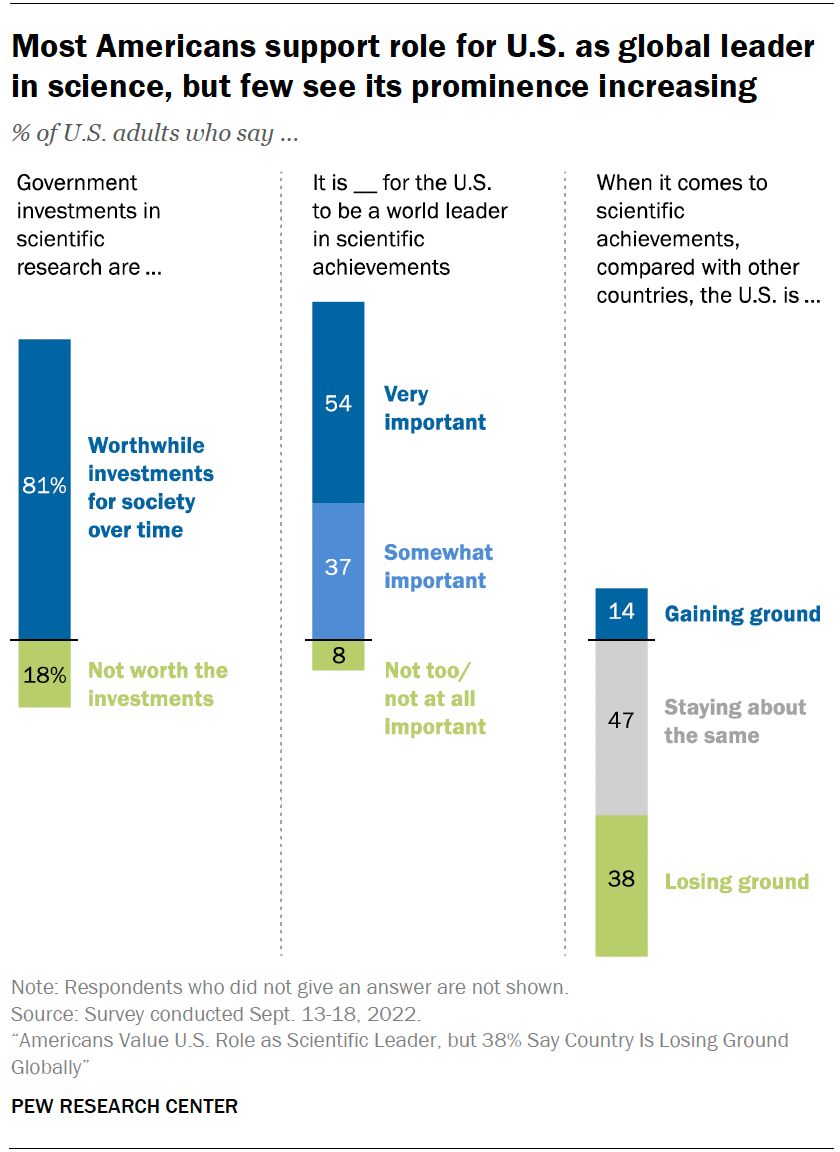
Large majorities of Americans value government investments in the scientific enterprise and consider it important for the United States to be a world leader in scientific achievement. However, on the heels of a global coronavirus outbreak that put scientific research and understanding in the spotlight, few believe the pace of scientific development in the U.S. surpasses that of other countries around the world. Just 14% think the U.S. is gaining ground on other countries in its scientific achievements. A larger share (38%) thinks the U.S. is losing ground, and 47% say it is staying in about the same place relative to other countries.
Republicans and Democrats express a shared sense that the U.S. is largely failing to gain ground in global scientific advances. Recent congressional action has included provisions to address U.S. competitiveness in scientific and technological fields, including a bill that provides tax incentives for manufacturing computer chips in the U.S. and additional money for scientific and technological research into areas such as artificial intelligence and quantum computing.
But while partisans share concerns about U.S. global standing in science, they differ in their views of the role for scientists in the policy arena, with Republicans offering much more skeptical views than Democrats. These differences over the public role for scientists are wider today than before the coronavirus outbreak, which has frequently found Republicans and Democrats at odds over science-related questions including the health threat posed by the coronavirus, the appropriate policy response to the outbreak and the effectiveness of mask wearing and COVID-19 vaccines.
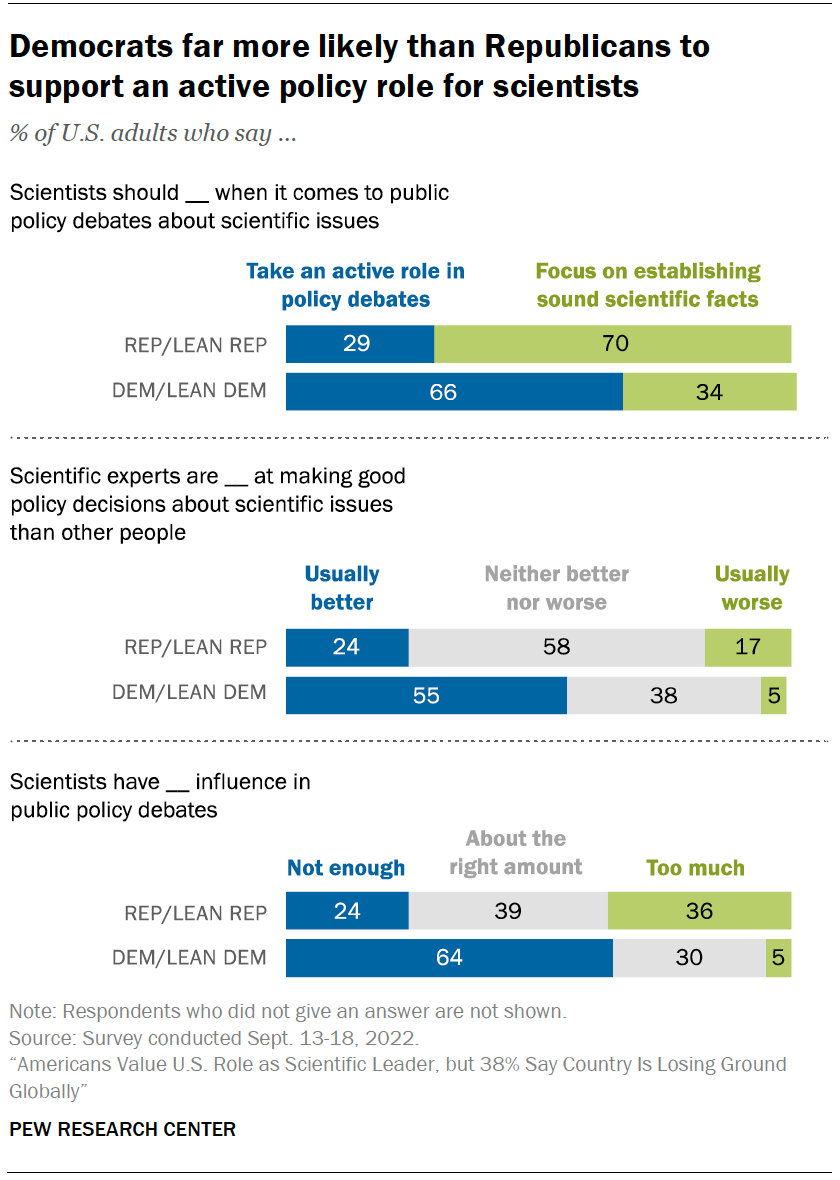
A majority of Republicans and independents who lean to the GOP (70%), believe that scientists should stay out of public policy debates and focus instead on establishing sound scientific facts. Republicans also express doubts about scientists’ judgment and decision-making: Just 24% believe scientific experts are usually better than other people at making good policy decisions about scientific issues.
Democrats and independents who lean to the Democratic Party offer far more positive views of scientists’ policy abilities. Two-thirds of Democrats believe that scientists should take an active role in science-related policy debates, and 55% believe that scientists usually make better decisions about science policy issues than other people. In addition, 64% believe that scientists currently do not have enough sway in public policy debates.
The survey of 10,588 U.S. adults conducted from Sept. 13 to 18 finds that the public continues to hold scientists and medical scientists in high regard relative to other prominent groups and institutions. Overall, 28% have a great deal of confidence in scientists to act in the best interests of the public, while another 49% say they have a fair amount of confidence. Ratings of medical scientists are similar. For both groups, public views are about the same as they were in December 2021.
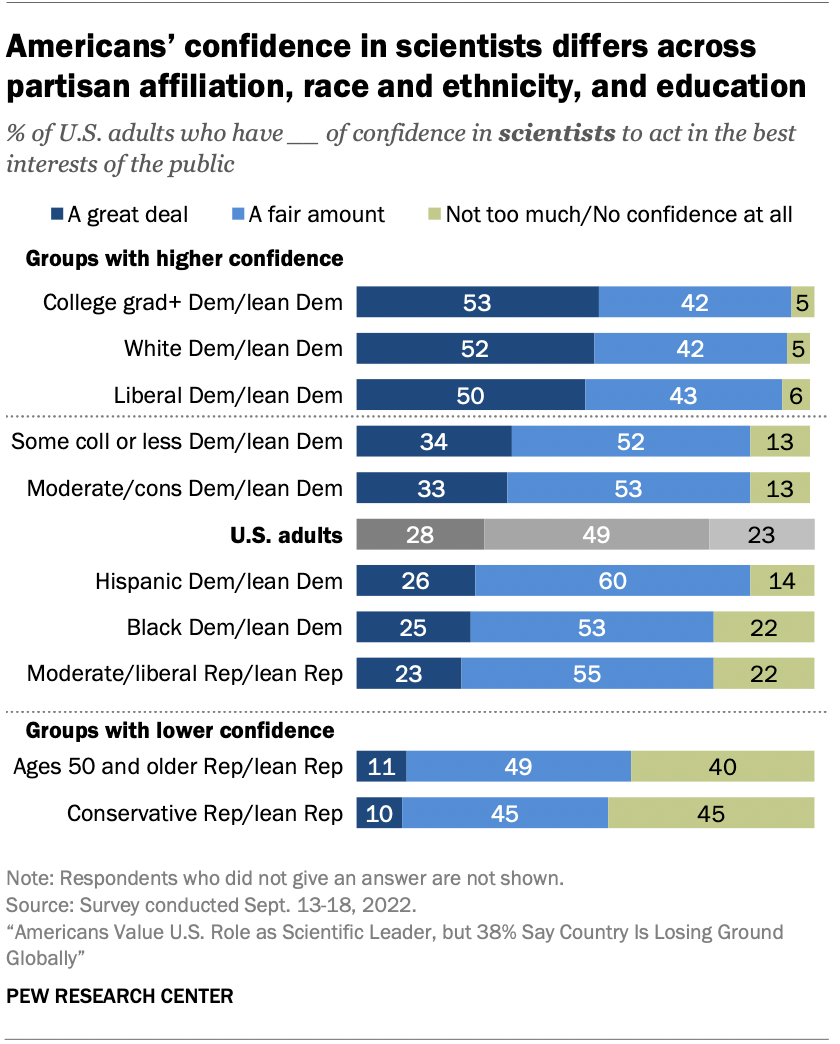
Ratings of scientists and medical scientists continue to be more positive than those of a number of other groups and institutions, including police officers and K-12 public school principals. Public confidence in elected officials to act in the public’s interests remains the lowest of the nine groups asked about in the survey.
Confidence in scientists differs across a range of traits and characteristics within the general public. Partisan affiliation is among the biggest factors, with Democrats expressing higher confidence than Republicans. But other factors such as race, ethnicity and education also play a role.
A large majority of Democrats (89%) say they have at least a fair amount of confidence in scientists to act in the public’s best interests, including 41% who say they have a great deal of confidence. By comparison, 63% of Republicans have at least a fair amount of confidence in scientists (including just 15% who have a great deal).
There are notable differences in views within both party groups, especially when it comes to the Democratic coalition. White Democrats (52%) are much more likely than Hispanic (26%) and Black Democrats (25%) to express strong trust in scientists, saying they have a great deal of confidence in them to act in the public’s interests. Democrats with a college degree are more likely than Democrats who have not graduated from college to say they have a great deal of confidence in scientists to act in the public’s interests (53% vs. 34%).
Differences in views within the GOP tend to be more modest than those among Democrats. Still, there are notable differences, especially by political ideology: 45% of conservative Republicans say they have not too much or no confidence at all in scientists; among moderate and liberal Republicans, significantly fewer (22%) express this low level of trust. In addition, Republicans ages 50 and older are less trusting of scientists than younger Republicans, especially those 18 to 29.
Confidence in scientists steady over past year, lower than early in the coronavirus outbreak
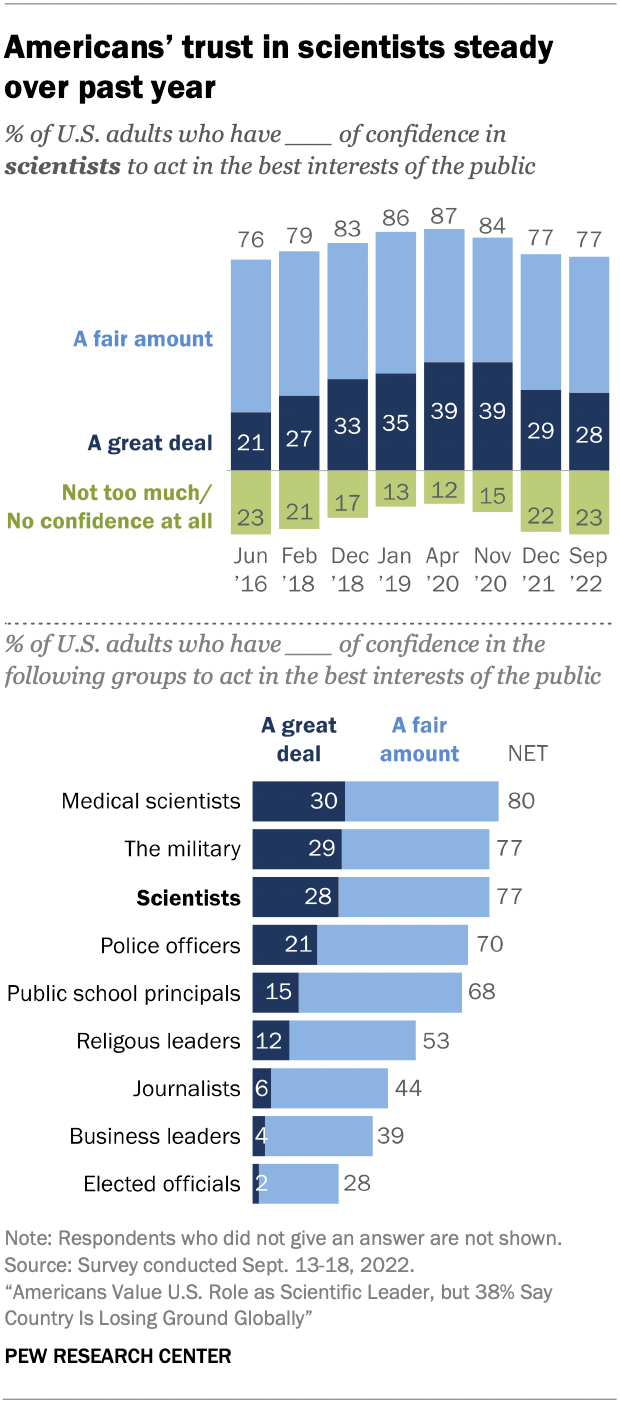
Roughly three-in-ten Americans register the strongest level of confidence in scientists to act in the public’s interests (28% a great deal) while at least three-quarters – 77% – have at least a fair amount of confidence in scientists. The 23% remainder has not too much or no confidence in scientists to act in the public’s interests.
Americans’ confidence in scientists has changed little since last year and remains below the high point expressed early in the coronavirus outbreak. Public confidence has also been largely steady over the last year for other prominent groups and institutions, such as police officers and business leaders.
Public confidence in medical scientists is similar to that of scientists generally. Eight-in-ten Americans have at least a fair amount of confidence in this group to act in the public’s interests, including 30% who have a great deal of confidence. (Half of survey respondents were asked about their confidence in “medical scientists” and the other half were asked about their confidence in “scientists.”)
Trust in the military is on par with that for medical scientists and scientists. The share of Americans with a great deal of confidence in the military is up 4 percentage points since 2021. Public trust in the other groups and institutions asked about in the survey is lower. Majorities in the U.S. hold negative views of journalists, business leaders and elected officials, in line with confidence ratings of these groups from last year. Just 28% of U.S. adults say they have at least a fair amount of confidence in elected officials to act in the public’s interests, and 71% have little or no confidence in them to do so.
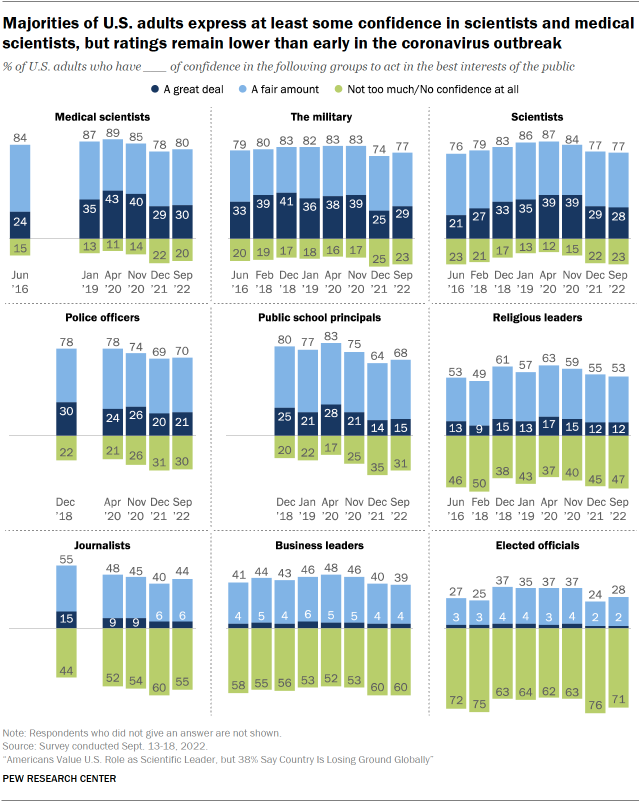
Trust in scientists remains higher among Democrats, especially those who are college graduates
Democrats continue to express more trust than Republicans in scientists and medical scientists to act in the best interests of the public. Partisan differences over trust in scientists widened after the coronavirus outbreak, especially as of December 2021, and have been stable since then.
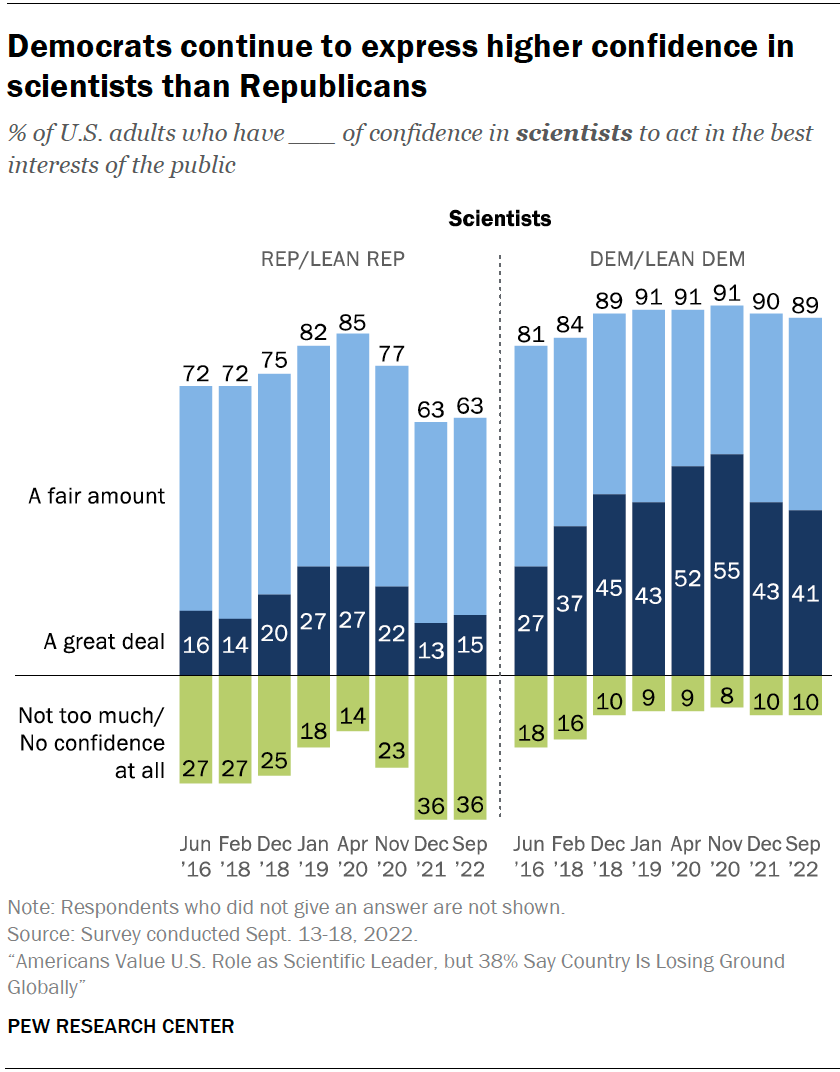
In the new survey, 41% of Democrats and those who lean Democratic have a great deal of confidence in scientists, though nearly all (89%) have at least a fair amount of confidence in scientists. Just one-in-ten Democrats have a negative view of scientists.
A much smaller share of Republicans and Republican leaners express a strong level of confidence in scientists (15%), though a majority (63%) express at least a fair amount of confidence in scientists to act in the public’s interests. Another 36% have little or no confidence in scientists.
Similarly, Democrats are far more likely than Republicans to express strong confidence in medical scientists to act in the public’s best interests. See Appendix for details.
Trust in scientists tends to be higher among college graduates than those with less education, consistent with past Center surveys.
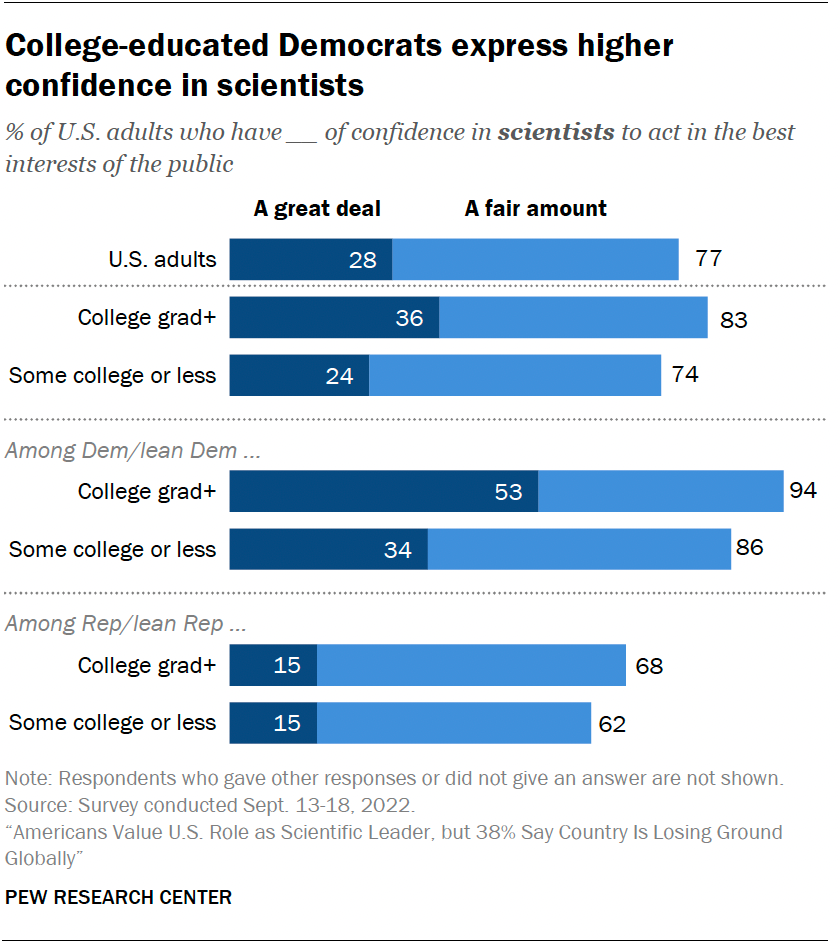
However, such differences are primarily limited to Democrats and independents who lean Democratic. Among Republicans and GOP leaners, college graduates and those with less education are equally likely to have a great deal of confidence in scientists (15% each).
Among Democrats with a college degree or more education, 53% have a great deal of confidence in scientists. In comparison, 34% of Democrats with some college or less education have a great deal of confidence in scientists.
This data is in line with the idea that party affiliation offers a strong anchor point for people’s views and, in some cases, can outweigh the tendency for those with higher education to express more support for and trust in scientists. Past Center surveys have also found education and science knowledge levels to be closely tied with views on climate and energy issues among Democrats, but not Republicans.
There are also larger education differences among Democrats than Republicans when it comes to levels of trust in medical scientists. See Appendix for details.
People who describe themselves as knowing a lot about what scientists do are more inclined to have high levels of confidence in scientists: 43% of this group has a great deal of confidence in scientists, compared with 26% who say they know a little and 14% who say they know nothing at all about what scientists do.
Confidence in scientists remains lower among Black and Hispanic Democrats compared with White Democrats
Among the general public, levels of trust in scientists are similar among White, Black and Hispanic adults. These overall similarities are driven in part by the partisan profiles of the three groups and the growing influence partisanship has on ratings of scientists. (A large majority of Black adults identify with or lean to the Democratic Party, as do roughly two-thirds of Hispanic adults; White adults are more evenly divided in their identification and tilt toward the GOP.)
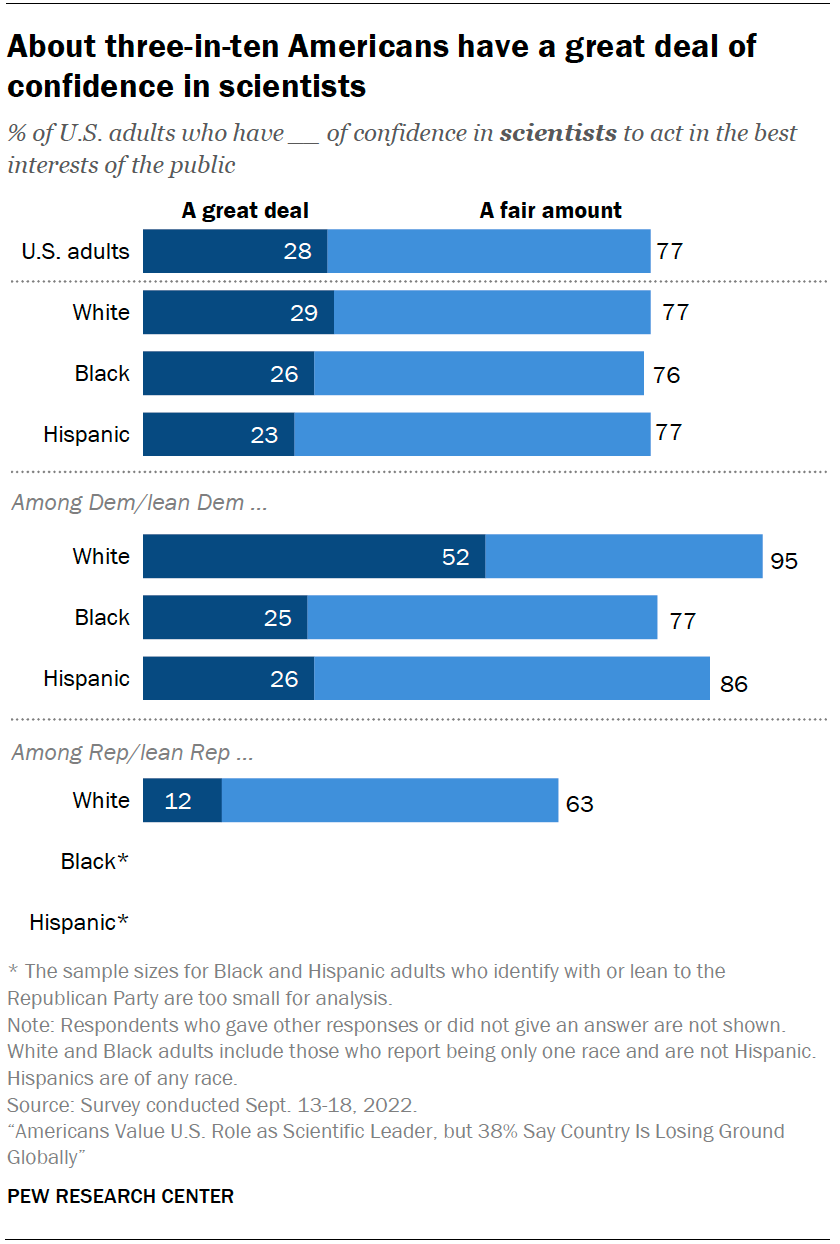
The impact of race and ethnicity plays out differently for Democrats and Republicans.
White Democrats (52%) are much more likely than Hispanic (26%) and Black Democrats (25%) to say they have a great deal of confidence in scientists to act in the best interests of the public.
Just 12% of White Republicans have a great deal of confidence in scientists to act in the public’s interests (far lower than the 52% of White Democrats who say this).
The current survey does not have sufficient sample size to analyze the views of Black Republicans or Hispanic Republicans. A 2021 Center survey found 19% of Hispanic and 12% of White Republicans expressed the strongest level of trust in scientists.
There are similar differences by party, race and ethnicity when it comes to confidence in medical scientists. See Appendix for details.
Americans are about evenly divided over whether scientists should take an active role in policy debates
The public has mixed views about the degree to which scientists should participate in policy debates over scientific issues and the impact scientists have on such debates. Differences between Republicans and Democrats on these questions have widened since 2020.
Americans are now roughly divided over whether scientists should take an active role in policy debates about scientific issues (48%) or should, instead, focus on establishing scientific facts and stay out of policy debates (51%).
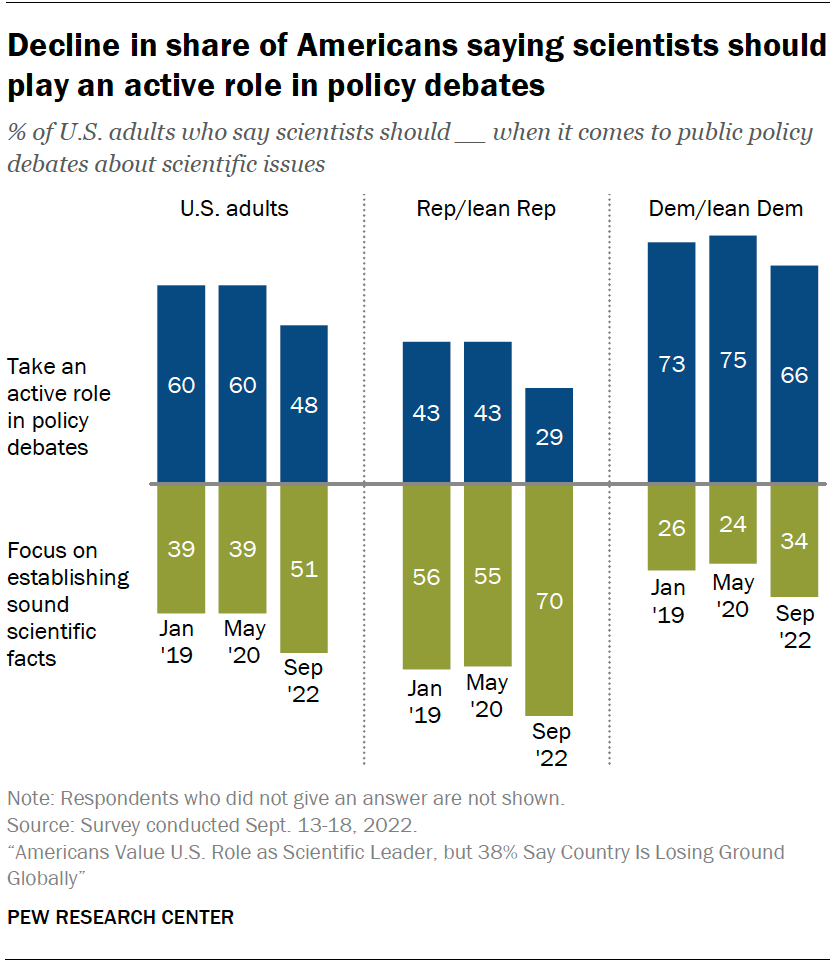
The share of Americans saying that scientists should play an active role in policy is down 12 percentage points since May 2020.
The change in views is more pronounced among Republicans and those who lean toward the GOP. Among this group, seven-in-ten now say scientists should stay out of policy debates and focus on establishing sound scientific facts. Far fewer Republicans (29%) now say scientists should take an active role in scientific policy debates, down from 43% in May 2020.
Democrats and Democratic leaners side with the position that scientists should have an active role in policy debates, by a margin of 66% to 34%. The share of Democrats who say scientists should take an active role in policy debates is down from 75% in May 2020.
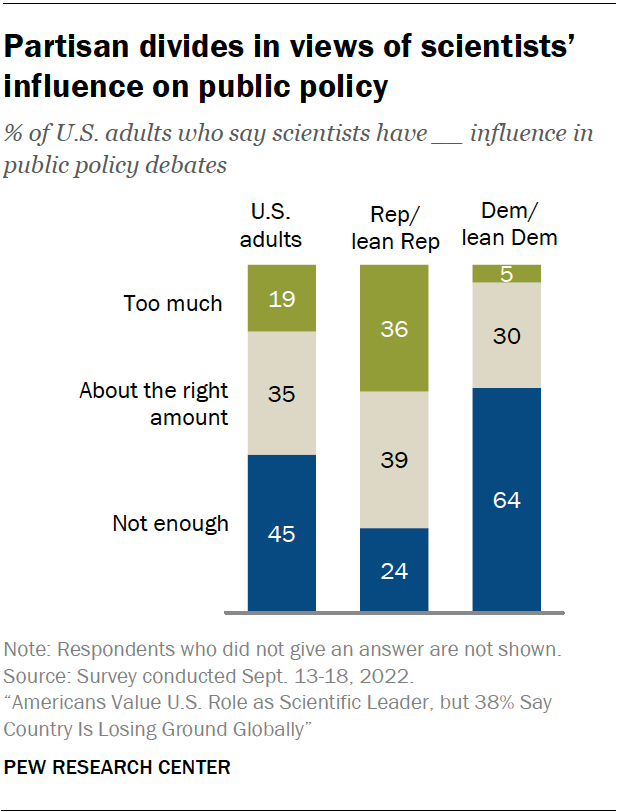
Partisans also tend to differ in their perceptions of scientists’ influence on policy debates today.
Overall, 45% of Americans say that scientists do not have enough influence on policy matters, while 19% say scientists have too much influence. About one-third say scientists have about the right amount of influence in policy debates (35%).
More than six-in-ten Democrats (64%) believe that scientists do not have enough influence on policy today. In contrast, 36% of Republicans think scientists have too much influence on public policy debates, while a smaller share (24%) believe scientists have too little influence.
Democrats and Republicans continue to differ in views of scientists’ policy judgments
The survey also asked Americans to evaluate the quality of scientific experts’ policy decisions about scientific issues. About four-in-ten Americans (41%) consider scientific experts to be usually better at making good policy decisions than other people, 47% say scientists are neither better nor worse and 10% say scientists usually make worse decisions than other people.
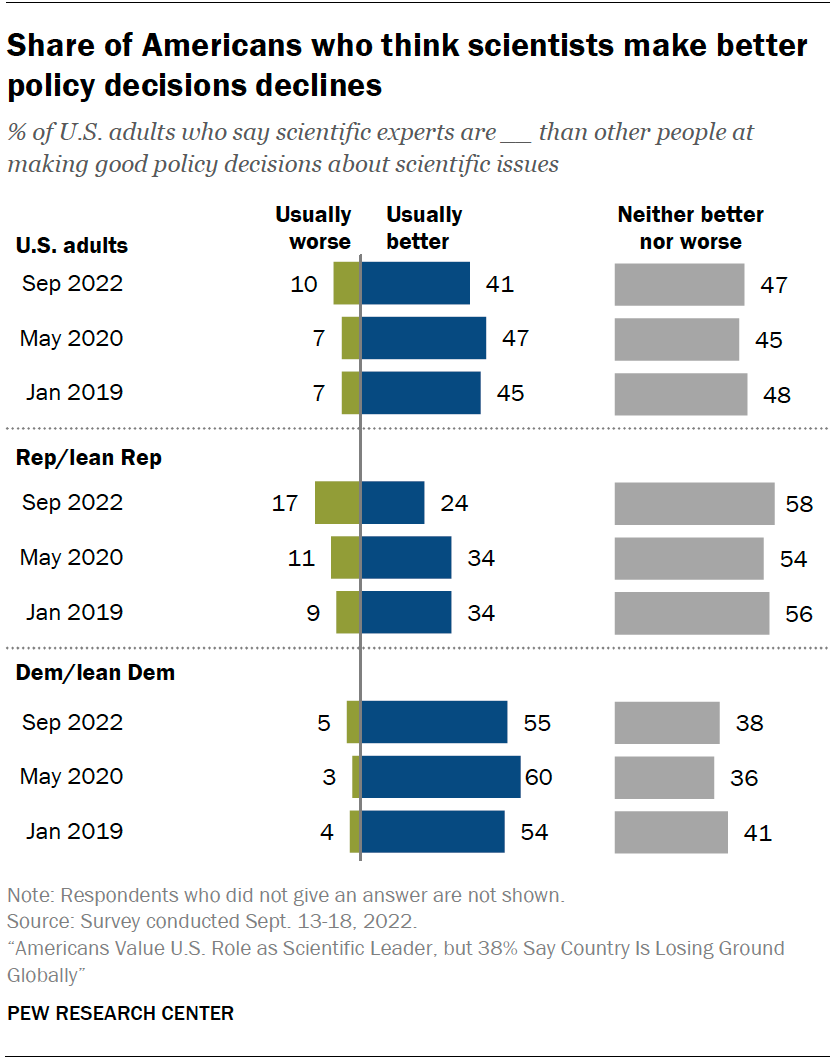
The share of Americans who say scientific experts are usually better than other people at making good policy decisions is down 6 percentage points since May 2020 (from 47% to 41%).
Among Republicans, most say scientific experts are neither better nor worse (58%) than other people at making good policy decisions. Just 24% of Republicans think scientists’ policy judgments are usually better than other people’s, while 17% say their judgments are usually worse.
In contrast, a majority of Democrats (55%) think scientific experts are usually better than other people at making policy decisions. The remainder (38%) says scientists’ judgments are neither better nor worse than those of other people and 5% say scientists’ judgments are usually worse.
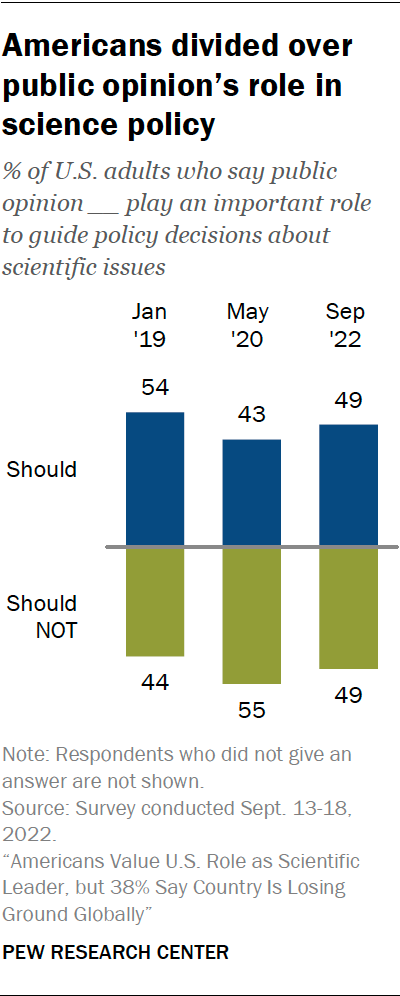
Americans are evenly divided over the role of the public’s voice in science-related policy matters. About half of U.S. adults say that public opinion should play an important role guiding policy decisions about scientific issues (49%), and the same share (49%) say public opinion should not.
The share of Americans who say public opinion should have an important role guiding policy decisions about scientific issues is up 6 points from May 2020 – early in the coronavirus outbreak – but down from a high of 54% in 2019.
Republicans are more likely than Democrats to say public opinion should play an important role (57% vs. 44%). The share of Republicans who say public opinion should play an important role is up 9 points since May 2020.
Americans with more education are less likely to say public opinion should play an important role guiding policy decisions about scientific issues. Four-in-ten adults with a postgraduate degree think public opinion should play an important role, compared with 54% of U.S. adults with a high school degree or less education.
Most Americans see government investments in scientific research as worthwhile, but few see gains for U.S. achievements in science
Most Americans see value for society from the government’s investments in scientific research and consider it important that the United States is a world leader in scientific achievement. The predominant sense, however, is that the U.S. is either holding steady or losing ground in science compared with other countries.
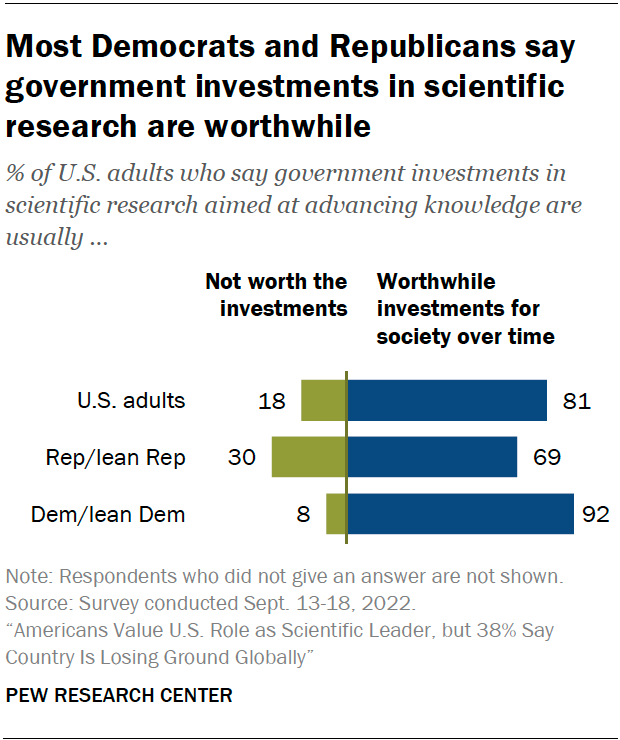
About eight-in-ten Americans (81%) say government investments in scientific research aimed at advancing knowledge are usually worthwhile for society over time, while only 18% say government investments in basic science research are not worth the investment.
These figures are similar to those found for U.S. adults in a 2019 Center survey conducted by telephone.
Almost all Democrats think government investments in basic science research are worthwhile investments for society over time (92%), as do a large majority of Republicans (69%).
Majorities across other demographic and educational groups say government investments in scientific research are worthwhile for society over time.
A large majority of Americans think being a world leader in science is important, but few see the U.S. gaining ground
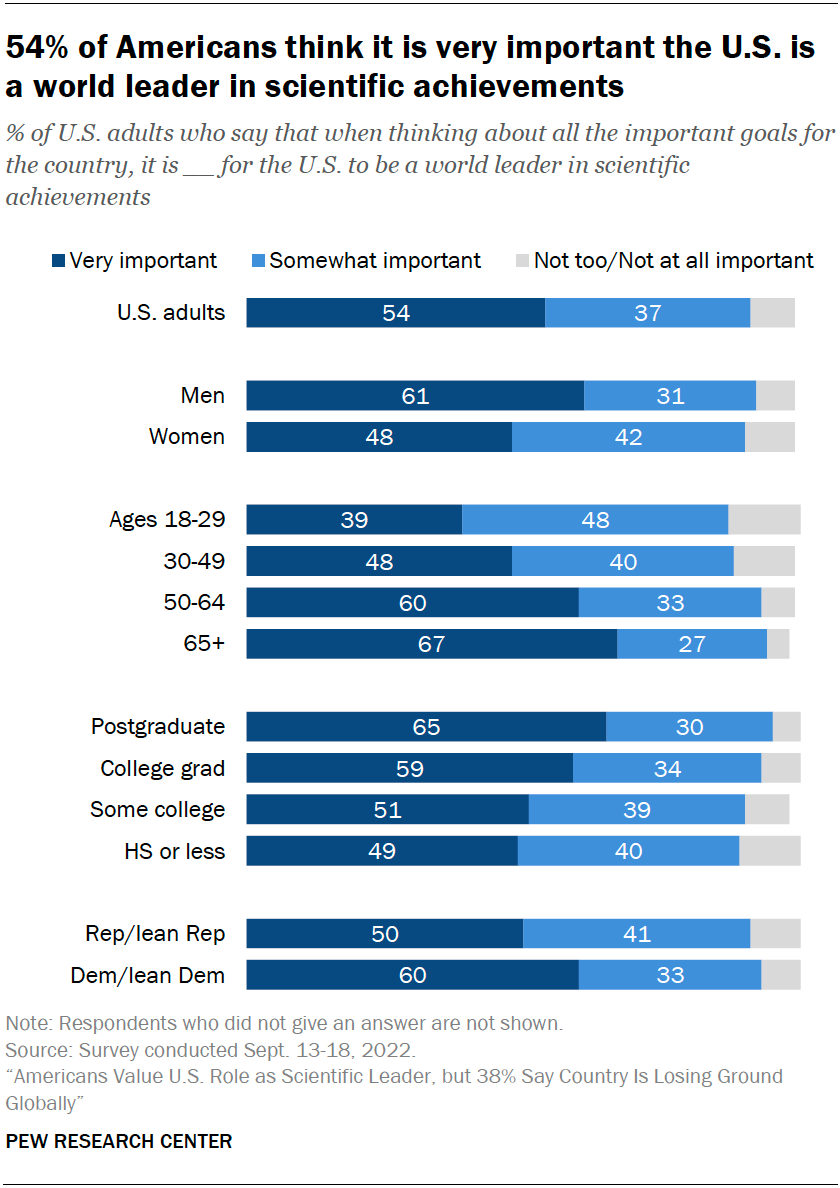
When asked how important it is for the U.S. to be a world leader in scientific achievements, 54% of Americans say it is very important and 37% say this is somewhat important. Just 8% say it is not too or not at all important that the U.S. is a world leader in scientific achievement.
Older Americans, men and those with a college degree or more education are especially likely to consider it very important for the U.S. to be a world leader in scientific achievements.
But when asked to think about America’s place compared with other countries, only 14% of the public thinks the U.S. is gaining ground in scientific achievements, while a larger share says the U.S. is losing ground (38%). Almost half (47%) say the U.S. is staying in about the same place when it comes to scientific achievements.
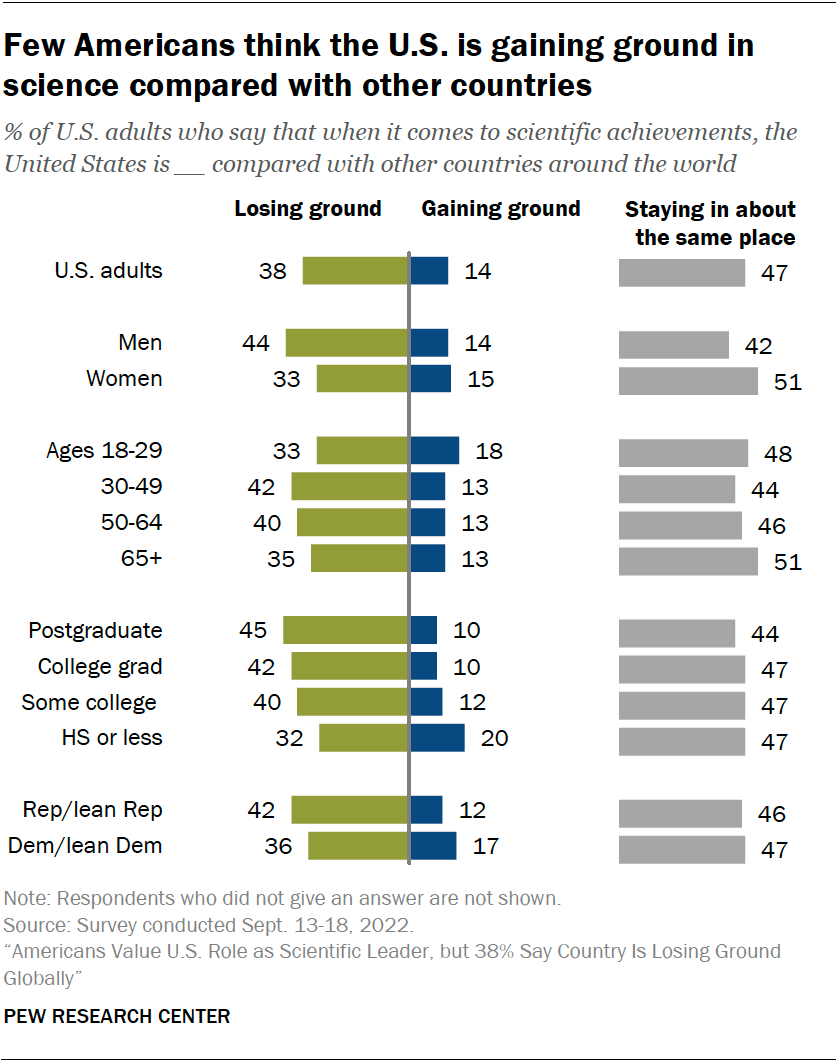
As is the case with views on the goal of being a world leader in science, assessments of where the U.S. actually stands globally are widely shared across party, educational and demographic groups.
Larger shares of men and those with a postgraduate degree consider the U.S. to be losing ground in science compared with other countries. Republicans are somewhat more inclined than Democrats to see the U.S. as losing ground to other countries in scientific achievements (42% vs. 36%).




